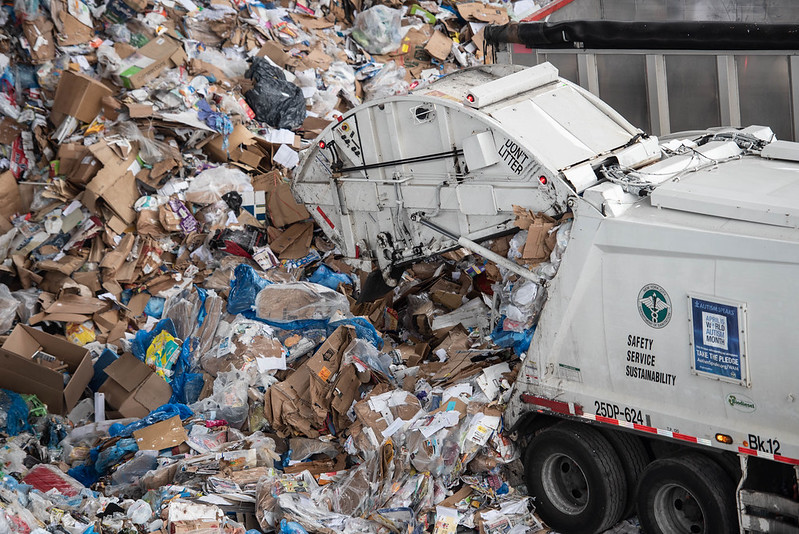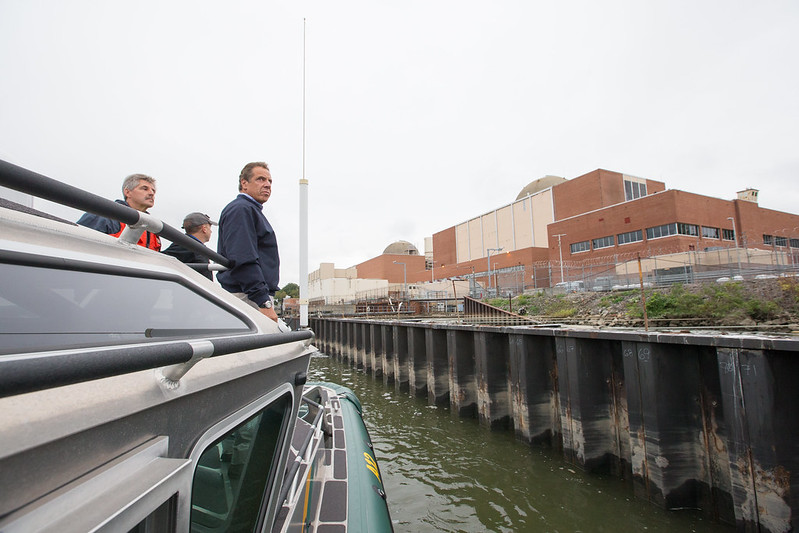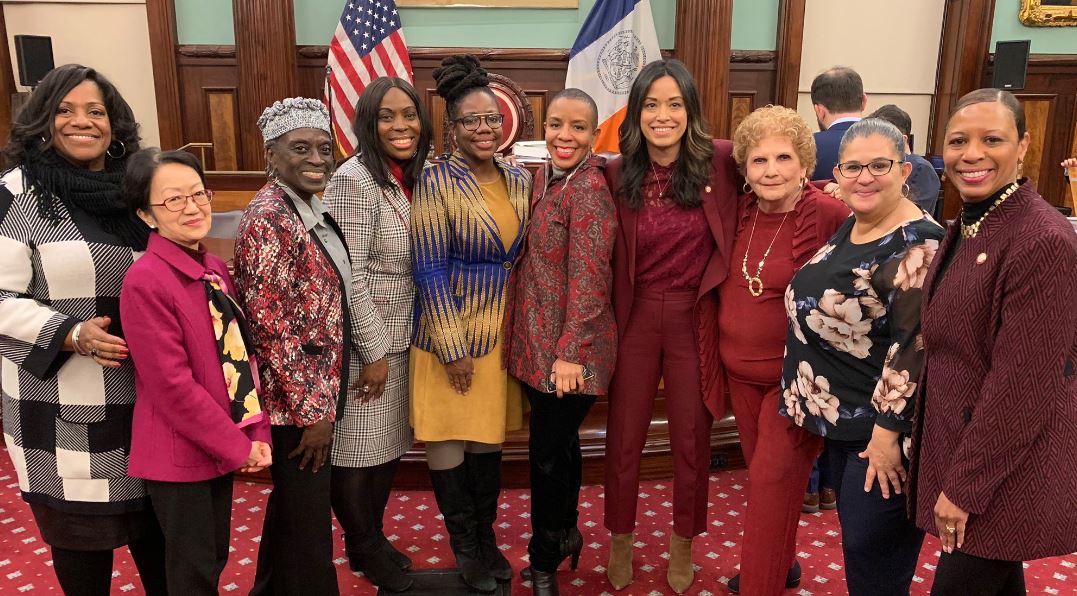The Coronavirus is Contributing to Environmental Unconsciousness, But Could Set the Stage for a Just Transition

Coronavirus presents an additional challenge & opportunity (photo: Michael Appleton/Mayor's Office)
Our atmosphere is getting a breath of fresh air, but it’s not because of the Paris Agreement or any political awakening to the climate crisis. It’s because of the new coronavirus, COVID-19. Yet even as emissions fall and we put our highly-carbonized business-as-usual on pause (from fewer people and planes flying to less driving and overall industrial activity) and air quality in certain regions rises, many New Yorkers and other Americans are living increasingly disposable and energy-intense lives that will inevitably have significant impacts on our environment, while plotting our post-pandemic return to an unsustainable prior status quo.
Troublingly, the long-term effects on environmental quality of COVID-19 seem harder to quantify, but it already seems clear that if this pandemic is a test of our environmental and climate commitments, we’re failing.
Certainly, coronavirus is an “environmental wake-up call.” This pandemic is generating the panic we need to tackle the climate emergency. My fear, though, is that by lauding temporarily falling emissions, we’re forgetting that we need to tackle the wasteful practices that have become integral to our daily lives—especially in New York City, where we generate over 3 million tons of waste annually (much of which is not actually trash).
Our dependence on disposable products and on disposability more broadly has immense consequences. If this is a wake-up call, we have to account fully for how our response to coronavirus impacts the planet and all of the life it supports. This isn’t just about surviving COVID-19; it’s about building a more sustainable and equitable society in the aftermath.
Despite vast backlash against plastic straws and New York’s recent plastic bag ‘ban,’ it seems that single-use products are back in style. With policies that mandate restaurants provide only takeout or delivery and concerns around touching solid surfaces that may hold residues of COVID-19, many of us are feasting out of plastic containers and stockpiling plastic bottles of everything from Purell to hair conditioner. From trying to follow public health advice as best we can, which often means wearing latex gloves and now, face coverings, to sanitizing our countertops using spray and paper towels, sterilizing our homes almost necessarily seems to translate into living unsustainably, even as it understandably reflects an important dedication to keeping ourselves and our loved ones healthy. We understandably forget about reducing, reusing, and recycling all too easily when we feel that any product kept too long or touched by too many hands may lead to our infection.
Our pandemic behavior has a clear consequence: trash. A lot of it. Think about every container, bag, wipe, paper towel you used once and tossed away this week—and how many other New Yorkers probably did the same. No doubt, it will contribute to landfills already overflowing with municipal solid waste or eventually, wind its way into the ocean, where it may join one of the world’s gyres of marine debris, like the Great Pacific Garbage Patch, and later, line the stomachs of marine life mistaking it for a meal. For those privileged enough not to live near the places our trash ends up, this great amount of waste may not pose an imminent concern. But along with the broader harms it poses to the environment, it will undoubtedly have human consequences, especially for already vulnerable communities. Landfills and hazardous waste sites in the United States are disproportionately located in communities of color and low-income communities. Trash is never just a question of the environment; it’s a question of environmental injustice.
Decreasing CO2 emissions in the short-run doesn’t solve our problems. In fact, as history suggests, it may only exacerbate them. Past episodes that led to similar declines in emissions, like the Great Recession, failed to have lasting effects. Meanwhile, social distancing and self-quarantine practices may encourage greater home energy use which, on net, could still lead to increased CO2 emissions. And, of course, with COVID-19 dominating the global political agenda and media headlines, there appears to be far less space for talk of climate change, undermining the political foothold gained by millions of largely youth climate activists over the last few years.
While we can’t be sure exactly what COVID-19 will ultimately mean for our planet, we can already see that it will not be good news for our current economy. With stock prices dropping and unemployment rising, there is a clear imperative to think about how our government spends its limited funds on both national and local levels. Will we rebuild the same vulnerable economy or support a just transition? Instead of bailing out fossil fuel companies, for instance, we should invest in creating new jobs in the clean energy sector. Sometimes, a shock to our stagnant system is just what we need to motivate us to transform it.
If we’re taking our planet and our communities’ health seriously, then we can’t forget about sustainability in the midst of this pandemic and we certainly can’t return to business as usual when it subsides.
New Yorkers (and all others) need to use this time as an opportunity to reevaluate our choices as consumers and more than that, to critically question a system that drives us to live in ways that disproportionately tax and damage the earth’s finite resources. What we need now are bolder climate and environmental policies. That means transforming society and the economy, which we now will have an even clearer, more pressing opportunity to do.
It means using our emergency response to invest in local and sustainable business models that can uplift communities, build resiliency, and support a regenerative economy. More immediately, it means finding ways to stay safe and healthy without depending upon many of the disposable products imperiling our futures.
***
Ilana Cohen is a climate activist. On Twitter @ilanabana.
***
Have an op-ed idea or submission for Gotham Gazette? Email This email address is being protected from spambots. You need JavaScript enabled to view it.
Governor Cuomo: Act Now to Protect New York City Electric Grid Amid Coronavirus Threat

Governor Cuomo at Indian Point (photo: governor's office)
Dear Governor Cuomo,
This letter is to alert your Administration and the City of New York that an unforeseen consequence of the coronavirus (COVID-19) pandemic is its likely impact on the reliability of the electric grid serving the New York City metropolitan area, and actions needed to be taken now to reduce these risks.
Blackouts anywhere/anytime are at best an inconvenience, but today they dramatically worsen the angst and economic pressure already being felt across the nation. In New York City, the loss of electric service has unusually dire consequences due to its densely populated urban setting.
With the near certainty that this pandemic will spread further in the metro area, a blackout would profoundly increase risks to the public’s safety and health - and could lead to panic.
We know that your primary concern is the health and safety of your constituents and that it was the key consideration in many of your recent decisions, from schools to bars to elections. In this current environment, and especially over the next few months, the State also needs to be especially vigilant in protecting the electric grid. Any actions that might degrade the grid’s reliability must be avoided.
Consequently, we urge you to postpone the scheduled permanent shutdown of the Indian Point Unit 2 (IP-2) nuclear facility later this month. An agreement reached in 2017 calls for shutting down IP-2 in April 2020. However, it will now coincide to when New York City (and perhaps State) may be facing maximum stress from the pandemic. Thanks to a prescient clause included in the 2017 agreement, the shutdown can be delayed in the event of an “energy emergency.”
We ask you to invoke this emergency clause and keep IP-2 in operation or, at a minimum, put it into a standby mode with its operating license intact and the ability to be brought back online quickly if needed.
The electric power market in downstate New York is exceptionally complex. Shutting down IP-2 (it generates 25% of downstate New York’s power) will significantly increase that region’s already high dependence on gas-fired electrical generation. These gas power plants are all fueled via a constrained long-distance transmission network that may experience problems over the next few months. There has been strong public resistance to expansion of the already-constrained gas pipeline system. Shutting down IP-2 put will cause immediate and significant increases in volumetric demand on that system as increased gas-fired generation fills in for the nuclear unit’s no-longer available power.
Unprecedented drops in the price of oil/gas are putting tremendous financial pressure on oil and gas companies, some of which may have to cease fracking operations and reduce workforce, putting further strain on the operation, upkeep, and maintenance of the interstate gas transmission system.
With the advent of the coronavirus and recent disruptions in the oil and gas industry, New York City will likely face large unanticipated swings in electrical demand and supply, availability of fuels, manpower, and other resources. We must act now to minimize potential problems.
The energy emergency provision should be utilized ASAP to assure that there is sufficient time to maintain IP-2’s generating capacity over the next few months. Because of the way nuclear plants are designed, the reactor’s core still has ample fuel and can be configured to run several additional months if needed before new fuel is required. However, the logistics may take some time to work out and keeping the plant in operation will require coordination with the plant’s owner, Entergy, and possibly the NRC. We are not trying to be alarmist, but believe it is within your power to avoid a potentially severe problem if you act now.
We are a group of scientists, engineers, and professionals offering to help New York State optimize its energy resources and policies. Please feel free to contact us if you have any questions or concerns, as we are here to assist you and the various agencies and authorities entrusted with providing safe and reliable electricity in New York.
Sincerely,
Gary Krellenstein; Philip Kahn, PhD; Keith Schue; Dietmar Detering, PhD; Keith Rodan; Isuru Seneviratne; Leonard Rodberg, PhD; & Herschel Specter, PE
***
Have an op-ed idea or submission for Gotham Gazette? Email This email address is being protected from spambots. You need JavaScript enabled to view it.
Coronavirus Crisis Worsens Challenges Faced by Women and Reaffirms Need to Elect More Women to Office

Most members of the New York City Council Women's Caucus (photo: @vanessalgibson)
The coronavirus pandemic amplifies many of society's systemic gender inequalities, magnified by race, class, and immigration status. Women, who have continued to carry the burdens of “women’s work” into the 21st century, are disproportionately impacted by this crisis, and women of color in New York City will fare the worst.
As nearly 50 women candidates running in the 2021 city election cycle and other women leaders, we have joined together to call attention to these issues and call for immediate and long-term solutions. And it is only by electing women to office will we enact the policies needed to address these inequalities.
In New York City, women make up 52% of the population, 60% of the voters, but only 24% of the City Council. Data shows that women, more than men, tend to look at the bigger picture, the entire family, and the community, and this is what we need right now. Representation matters.
The reality is stark for women during this crisis. Women, and overwhelmingly women of color, are far more likely to work as daycare and early childhood educators, house cleaners, home health aides, and nannies. All of these positions are at high risk and many women will be unemployed throughout the duration of this crisis.
With schools closed, women who are actually able to work from home are balancing working full-time while also homeschooling, tending to elders, managing family health care, and doing the invisible work of maintaining the household. It may be 2020, but the reality is that in many families women are still the primary caregivers. Additionally, 80% of single-parent households are headed by women, for whom the pressure is even higher.
Women who are small business owners, work in service or retail, or drive taxis are also seeing their livelihoods suffer. And women’s careers will not bounce back as soon as the crisis ends. We know from previous infectious-disease outbreaks that men’s incomes recover faster after the outbreak, while the impact on women’s careers can last for years.
This crisis disproportionately impacts women, particularly women of color, in other ways as well. New moms who rely on Women, Infant & Children (WIC) can’t get the food they need because only certain items 'qualify' for WIC and many of these products sell out quickly in the rush to hoard.
The number of women and children at risk of domestic and sexual violence increases as families are shut-in together under stress. Women and children also make up the largest portion of people experiencing homelessness, and shelters are not equipped to contain the spread of the virus.
Women's health is also on the line. Texas and Ohio halted abortions, classifying them as a non-essential medical procedure. Women about to give birth are receiving mixed messages about whether they will be able to have partners with them in the delivery room (New York has clarified that they can have a non-sick partner or other support person). Most nurses are women risking their health on the frontlines to care for those who are sick and then going home to care for their families.
These issues aren’t new, but COVID-19 will make the scale of the disparities stark. We need immediate action, including financial support paid directly to families, including undocumented families, to help weather this crisis. In the short-term, hotel rooms empty due to the crisis are a safer solution for those experiencing homelessness, and temporary shelter for women and children who experience abuse.
We should get rid of the red tape on WIC-approved necessities so parents can purchase what they need based on what's available in the stores. We must ensure adequate protective gear is available for our health care workers, including home health aides and women working in nursing homes.
Longer-term, our policies need to work for the people who are doing the work with solutions like paid family leave, universal family care, and universal, affordable healthcare accessible to all, regardless of immigration status.
In 2021, we have the opportunity to elect new leaders to the two-thirds of City Council seats that will be open due to term limits. There are dynamic, competent, exciting women running for all of these seats. We have a chance to reshape our city leadership and the way the city works for women, families, and all New Yorkers. Coronavirus has magnified just how important that is.
***
This op-ed has been co-signed by the following 50 members of 21 in ‘21:
City Council Member Helen Rosenthal, Chair of the Committee on Women and Gender Equity and New York City Comptroller Candidate
Sara Lind, City Council Candidate District 6, 21 in ‘21 Interim Executive Director
Lynn Schulman, City Council Candidate District 29
Crystal Hudson, Kings County Committee Representative 57th AD
Jessica Haller, City Council Candidate District 11
Rebecca Lamorte, City Council Candidate District 5
Kim Moscaritolo, City Council Candidate District 5
Tricia Shimamura, City Council Candidate District 5
Kristin Richardson Jordan, City Council Candidate District 9
Sheba Simpson, City Council Candidate District 9
Johanna Garcia, City Council Candidate District 10
Yudelka Tapia, City Council Candidate District 14
Ischia Bravo, City Council Candidate District 15
Elisa Crespo, City Council Candidate District 15
Althea Stevens, City Council Candidate District 16
Amanda Farias, State Committeewoman 87th AD, City Council Candidate District 18
Darlene Jackson, City Council Candidate District 18
Jaime-Faye Bean, City Council Candidate District 22
Julia Forman, City Council Candidate District 26
Heajin (Hailie) Kim, City Council Candidate District 26
Kerryanne Burke, Esq., City Council Candidate District 27
Nantasha Williams, City Council Candidate District 27
Monique Charlton, City Council Candidate District 31
Felicia Singh, City Council Candidate District 32
Elizabeth Adams, City Council Candidate District 33
April Somboun, City Council Candidate District 33
Sandy Nurse, City Council Candidate District 37
Alexa Aviles, City Council Candidate District 38
Whitney Hu, City Council Candidate District 38
Shahana Hanif, City Council Candidate District 39
Nicole Hunt, City Council Candidate District 39
Cecilia Cortez, City Council Candidate District 40
Mercedes Narcisse, City Council Candidate District 46
A. Dimple Willabus, City Council Candidate District 46
Amoy Barnes, City Council Candidate District 49
Marjorie Velazquez, District Leader 82nd AD Part B
Olanike Alabi, State Committeewoman, District Leader 57th AD
Sandra Ung, State Committeewoman 40th AD
Amber Adler, Chair of Neighborhood Advisory Board 15
Indiana Porta, Esq., Community Advocate and Legislative Attorney
Kim Watkins, Manhattan Borough President Candidate
Dianne Morales, Mayoral Candidate
Jordan Jayson, Democratic Strategist
Amelia Adams, 21 in ‘21 Board Chair
Yvette Buckner, 21 in ‘21 Board Vice Chair
Melissa Lirtsman, 21 in ‘21 Board Member
Camille Rivera, 21 in ‘21 Board Member
Dr. Debbie Almontaser, 21 in ‘21 Board Member
Elyse Byxbaum, 21 in ‘21 Board Member
Heidi Sieck, 21 in ‘21 Board Member
***
Have an op-ed idea or submission for Gotham Gazette? Email This email address is being protected from spambots. You need JavaScript enabled to view it.




